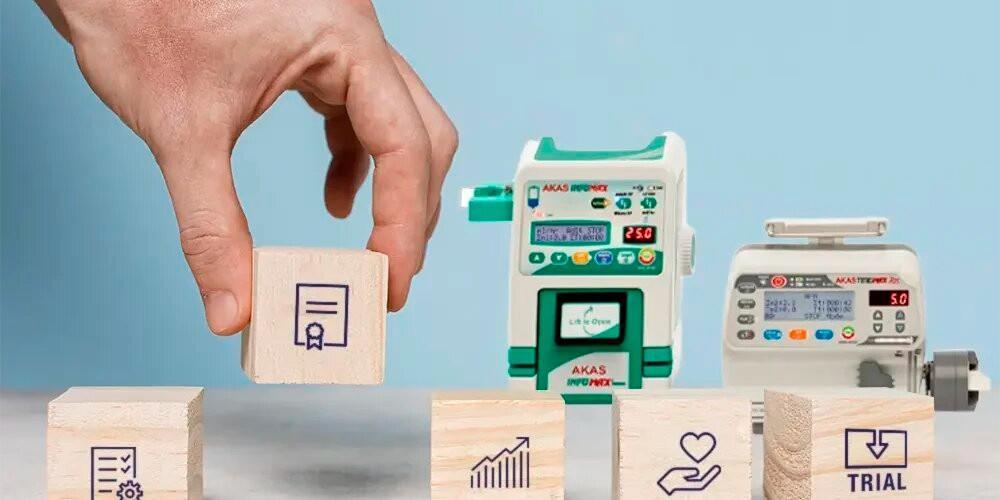Lifetime Value Matters: Long-Term Support for Infusion Pumps

Introduction
In healthcare, every equipment decision affects more than cost — it impacts patient safety, staff workflow, and long-term hospital efficiency.
Among critical care tools, the infusion pump plays a central role in drug delivery, fluid management, and therapeutic accuracy.
Yet, while features and price often drive the purchase, long-term support is the factor that ensures consistent reliability and true lifetime value.
Why Long-Term Support Makes a Difference
1. Equipment Longevity Protects Hospital Investments
-
Infusion pumps are high-value assets intended for daily use.
-
With proper support, their performance remains stable across years.
-
Maintenance and technical service can add 3–5 years to device lifespan.
2. Consistent Calibration Ensures Medication Accuracy
-
Regular servicing keeps calibration within safe, clinical ranges.
-
Minimises dosage errors that can occur with undetected drift.
-
Protects hospital reputation and enhances patient safety.
3. Staff Confidence Comes from Stable Equipment
-
Nurses and technicians rely on predictable, responsive pumps.
-
Malfunctions cause anxiety, interruptions, and loss of time.
-
Ongoing support ensures fewer breakdowns and smoother shifts.
4. Software Updates Keep Devices Future-Ready
-
Healthcare standards evolve, especially in drug infusion protocols.
-
Regular updates help pumps adapt to new compliance or features.
-
Long-term support bridges current use with future-readiness.
5. Replacement Parts Availability Avoids Downtime
-
Infusion pumps need occasional replacement of valves, batteries, or sensors.
-
Manufacturers with extended support ensure parts are always available.
-
Reduces emergency delays caused by unavailable components.
6. Emergency Service Reduces Patient Risk
-
Unexpected failures must be met with quick, expert response.
-
Support-backed pumps receive priority attention during outages.
-
Minimises treatment disruption, particularly in ICUs or oncology wards.
7. Scheduled Preventive Maintenance Lowers Cost of Repairs
-
Regular maintenance helps identify issues before they escalate.
-
Lessens the need for costly, unplanned repairs or replacements.
-
Preserves hospital budgets without compromising clinical outcomes.
8. Centralised Documentation Aids Compliance and Audits
-
Long-term partners help keep maintenance records well-documented.
-
Essential for NABH, JCI, or other healthcare accreditation processes.
-
Simplifies audit reviews and ensures transparency.
9. Training and Re-Training Become Seamless
-
With long-term vendor relationships, staff training is easier to manage.
-
Updates or new staff induction programs become more consistent.
-
Reduces errors and misuse caused by knowledge gaps.
10. Custom Service Agreements Support Facility-Specific Needs
-
Not all hospitals operate the same — some need faster turnaround or mobile servicing.
-
Long-term support often includes flexible contracts and local service centres.
-
Clinics and multispecialty centres benefit from tailored service terms.
The Risks of Choosing Short-Term Solutions
1. No Support Means Higher Downtime Risks
-
Cheaper pumps without service plans often break down sooner.
-
Without backup, hospitals face delays in patient therapy.
-
Renting or emergency replacements create unnecessary cost and hassle.
2. Inconsistent Quality Control Affects Patient Outcomes
-
Lack of proper calibration or maintenance impacts drug delivery accuracy.
-
Dosing inconsistencies can cause under-infusion or overdosing.
-
Hospitals risk both safety violations and poor patient experiences.
3. Discontinued Parts Lead to Premature Replacement
-
Infusion pumps without long-term parts access become obsolete quickly.
-
Hospitals may be forced into bulk replacements ahead of schedule.
-
Adds hidden costs not factored during purchase.
4. Absence of Software Support Can Compromise Data Integrity
-
Older pumps without firmware updates may lack cybersecurity safeguards.
-
Integration with hospital EHR systems may fail.
-
Long-term support protects both data and device performance.
What to Look for in a Long-Term Support Partner
1. Proven Track Record in Medical Device Service
-
Choose infusion pump providers with service history and client references.
-
A strong support network means fewer disruptions in critical care.
2. Dedicated Support Teams and Local Reach
-
Regional service centres ensure faster response times.
-
Local expertise builds trust and familiarity with hospital protocols.
3. Transparent Warranty and AMC Options
-
Ask about service-level agreements (SLA), extended warranties, and upgrade options.
-
The best suppliers offer clarity and flexibility based on hospital needs.
4. Commitment to Training and Feedback Loops
-
Support should include regular workshops or digital training modules.
-
Helps staff stay updated, especially during staff turnover or tech upgrades.
5. Easy Access to Documentation and Digital Support Tools
-
Cloud-based service logs, mobile apps, or online portals are helpful.
-
Gives hospital engineers and admins direct access to reports and diagnostics.
Conclusion
In an era where hospitals are expected to do more with fewer resources, investing in an infusion pump must go beyond initial pricing and features.
Long-term support protects patient safety, reduces service gaps, extends device lifespan, and ensures your facility stays audit-ready.
Akas Infusion, currently the largest manufacturer, aims to become the global leader in Syringe and Infusion Pumps — delivering not only trusted equipment but dependable lifetime care.
- Art
- Causes
- Crafts
- Dance
- Drinks
- Film
- Fitness
- Food
- Giochi
- Gardening
- Health
- Home
- Literature
- Music
- Networking
- Altre informazioni
- Party
- Religion
- Shopping
- Sports
- Theater
- Wellness


